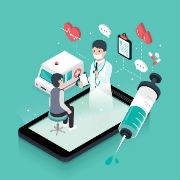Experts Name Intelligent Enterprise Top Health IT Trend
Industry experts name intelligent enterprise the top health IT technology of the decade as IoT and connected medical devices continue to improve patient care.

- Intelligent Enterprise emerged as the top technology trend of the decade according to Zebra Technologies and their recent research partnership with the Technology and Entrepreneurship Center at Harvard (TECH).

Zebra and TECH gathered 40 executives, industry experts, and policymakers across all major industries for the 2016 Innovation Symposium: The Intelligent Enterprise, including GE Healthcare, Google, and IBM.
Industry experts discussed the impact of the intelligent enterprise and the future of the technology in conjunction with the internet of things (IoT).
"Change is happening at a rapid pace,” said Tim Kottak, CTO of GE Healthcare. “Today's hospitals are up against changes in regulation, cost pressures, competition and higher standards for patient safety. Because of this, GE has used data and machine learning to become a partner that provides not only medical equipment, but also solutions that improve outcomes. We believe IoT holds endless opportunities in healthcare, from predictive patient care to the way pharmaceuticals are made – and we've only just begun."
GE Healthcare is involved in intelligent enterprise technology and their Dose Management solutions are automated to collect and analyze patient radiation exposure across multiple imaging environments. Clinicians will use this technology to monitor and evaluate patients more accurately and adjust medication dosage accordingly.
While the event covered several major industries, healthcare was a major focus for experts. Intelligent enterprise along with the IoT will assist medical institutions in integrating technology within the organization.
Experts at the event advised that in-house technology integration needs to start with creating software solutions collaboratively with the vendor and the healthcare organization. The goal of intelligent enterprise technology in healthcare is to collect data and which can be turned into insights and predictions.
The event whitepaper advised that the need for intelligent enterprise in healthcare technology is due to the technological transitions the healthcare industry is currently facing. Yuri Quintana, Assistant Professor, Harvard Medical School, and Director of Global Health Informatics, attributes longer average lifespan of patients along with a projected future shortage of healthcare professionals as a major driving need for intelligent enterprise technology.
“People are living longer but with more conditions that require multiple healthcare specialists,” said Quintana. “According to estimates from the World Health Organization (WHO), the proportion of our population over sixty years old continues to grow and will triple by 2050.”
“There is already a shortage of four million health care providers, and by 2050 we will have a shortage of 12 million providers,” Quintana continued.
The internet of things plays a large part in healthcare intelligent enterprise. Quintana’s concerns of patients living longer with more treatable, long-term health conditions along with the potential shortage of medical professionals due to rising education costs and several other factors, patient wearables will give clinicians relief when it comes to the number of patients needing to physically come into a medical practice for on-site treatment.
Patients will be able to consult their wearables and communicate with a healthcare database or remote physician for minor health concerns or to determine if a trip to their healthcare provider is necessary.
Patients have also come to expect accommodation of wearables for their healthcare needs as the popularity of wearable devices and consumer apps for tracking personal health grows. Organizations will eventually have to embrace the IoT and start considering how it will affect their health IT infrastructure.
Healthcare IoT and intelligent enterprise technology is not limited to patient wearables and remote care. Connected medical devices are also part of the healthcare IoT and connected medical equipment communicates with staff when maintenance is required before it malfunctions. Medical device communication saves organizations time on lengthy repairs by communicating when preventative maintenance measures need to be taken, saving organizations money by extending the life of expensive medical equipment
Dig Deeper:
- Understanding HIPAA-Compliant Cloud Options for Health IT
- Health Catalyst Launches Open-Source Machine Learning
